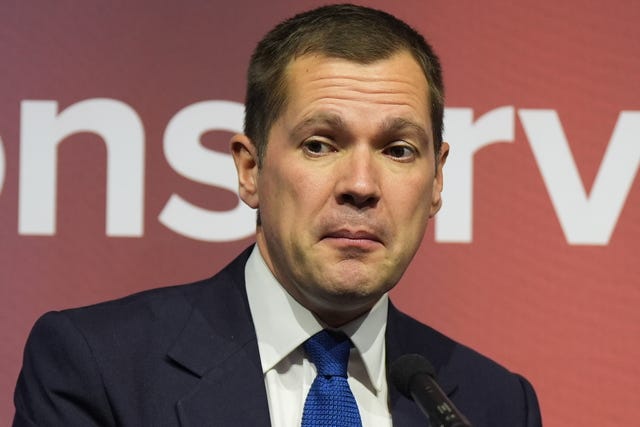
A prominent businessman has named himself as the source of a £75,000 donation to Robert Jenrick amid transparency concerns over the ultimate origin of the funds.
Entrepreneur Phillip Ullmann said he gave the money to the Conservative Party leadership frontrunner through Spott Fitness, a fitness coaching app provider which he said is “part of my family’s group of businesses”.
However, Mr Ullmann’s name does not currently appear on the list of people with significant control in Spott Fitness at Companies House, leaving a question mark over his formal links to the organisation.
Labour has demanded an investigation into the origin of the money after Mr Jenrick received three donations of £25,000 from the business in July.

Its latest accounts show it has no employees, has never made a profit and has more than £300,000 of debts, and in January it registered a loan from Centrovalli, a company registered in the British Virgin Islands.
The ownership of companies registered in the British Virgin Islands is not made public, which had led the ruling party to demand answers on where the money donated to Mr Jenrick ultimately came from.
In a statement on Monday, Mr Ullmann said he wanted to avoid suggestions that he is “hiding anything” and insisted he understands the importance of transparency surrounding political donations.
“I’ve been a successful businessman over the years. But in recent times I’ve become concerned about the grave challenges facing the UK and the rest of the world,” he said.
“I tried, unsuccessfully, to make some of that right by changing my businesses into social enterprises. But I’ve come to see that we need huge political change.”
He said he has been “giving to figures of a broadly communitarian bent for several years”, including Labour peer Maurice Glasman, Tory MPs John Hayes and Danny Kruger, the New Conservatives, and the New Social Covenant Unit.
Mr Ullmann added: “I also wanted to back Robert Jenrick whose serious solutions to big challenges – including on migration – appeal to me. I don’t agree with him on everything but broadly we are aligned.
“I chose to give the money from Spott Fitness, a company which is part of my family’s group of businesses. It’s a phenomenal company that’s using tech to improve people’s health and will be a hugely successful business.
“But I don’t want there to be any suggestion at all that I’m hiding anything and I understand the importance of donor transparency. So I’m happy to confirm my connection to Spott. I love my country, I was born and raised in the UK, and have always paid tax and lived here.
“I’m going to continue to set out my ideas for changing the world and our financial system and am always happy to meet with people and set out my ideas in this space.”
Labour chairwoman Ellie Reeves had said in a letter to the Electoral Commission: “Donations to MPs must come from sources registered in the UK. It is clear that Mr Jenrick has serious questions to answer about the origin of these funds and their legality.”
A source close to Mr Jenrick’s campaign dismissed Labour’s request as “nonsense”, saying it served to “prove who Labour fear the most”, while the leadership contender told Sky News on Sunday that the donation had been “perfectly legal and valid”.
The questions come amid rows about senior Labour figures accepting donations from Lord Waheed Alli, although Mr Jenrick stressed he was not criticising the donations but what he called Labour’s “rank hypocrisy”.
Britain’s laws on political donations have long been criticised by transparency campaigners as too weak to prevent anonymous money from impermissible donors entering the system.
Earlier this year, Transparency International UK told a parliamentary committee there was “a growing body of evidence suggesting it is far too easy for money of unknown or questionable provenance to enter our political system”.
It pointed to the “low bar” for foreign companies to be allowed to donate money to UK politicians – firms only have to be “carrying on business in the UK” and there is no requirement for donations to be generated from UK profits – and claimed existing rules have proven “almost unenforceable in practice”.


Comments: Our rules
We want our comments to be a lively and valuable part of our community - a place where readers can debate and engage with the most important local issues. The ability to comment on our stories is a privilege, not a right, however, and that privilege may be withdrawn if it is abused or misused.
Please report any comments that break our rules.
Read the rules here